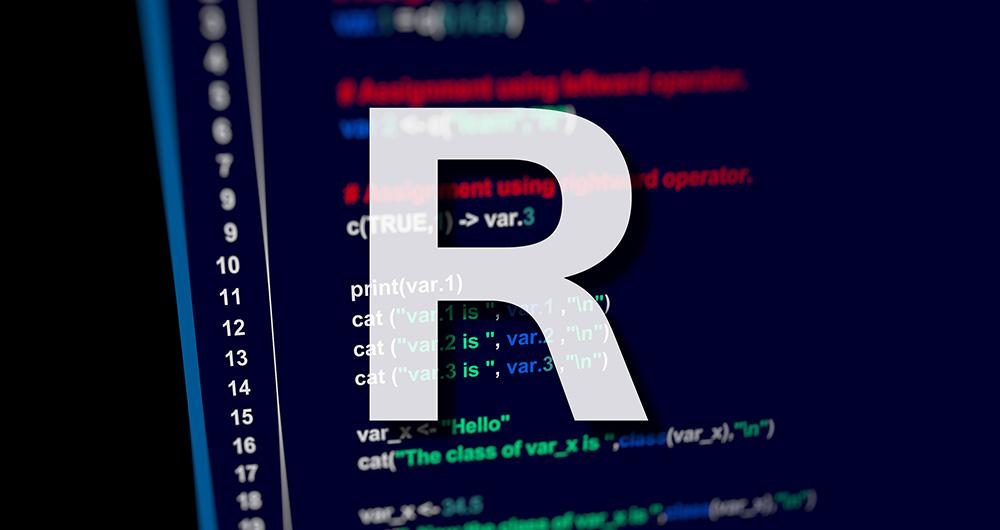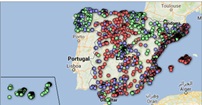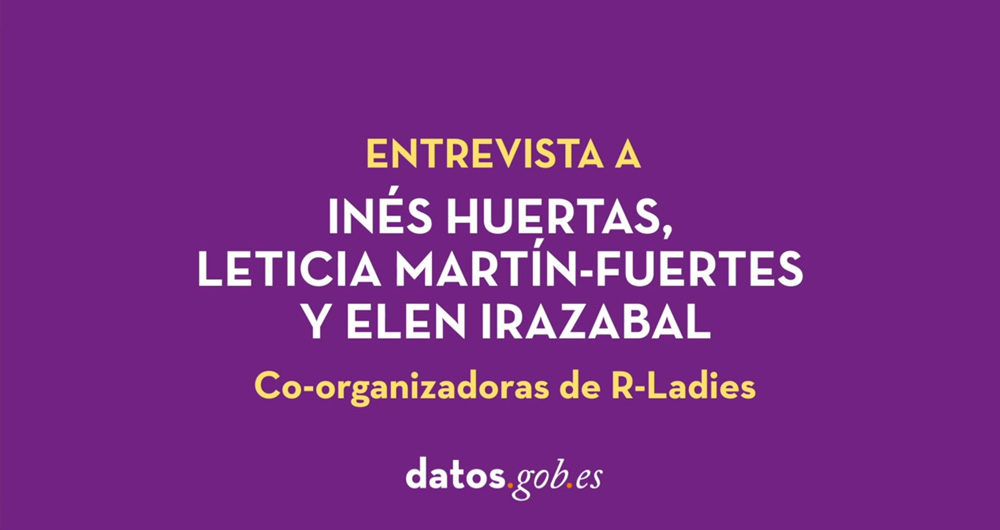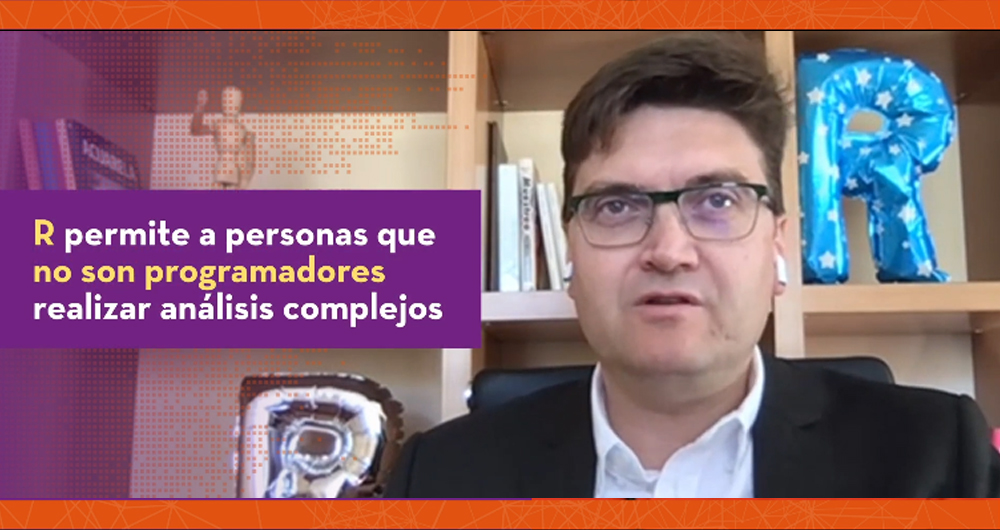
R is one of the programming languages most popular in the world of data science.
It has a programming environment, R-Studio and a set of very flexible and versatile tools for statistical computing and creation of graphical representations.
One of its advantages is that functions can be easily expanded, by installing libraries or defining custom functions. In addition, it is permanently updated, since its wide community of users constantly develops new functions, libraries and updates available for free.
For this reason, R is one of the most demanded languages and there are a large number of resources to learn more about it. Here is a selection based on the recommendations of the experts who collaborate with datos.gob.es and the user communities R-Hispanic and R-Ladies, which bring together a large number of users of this language in our country.
Online courses
On the web we can find numerous online courses that introduce R to new users.
Basic R course
- Taught by: University of Cádiz
- Duration: Not available.
- Language: Spanidh
- Free
Focused on students who are doing a final degree or master's project, the course seeks to provide the basic elements to start working with the R programming language in the field of statistics. It includes knowledge about data structure (vectors, matrices, data frames ...), graphics, functions and programming elements, among others.
Introduction to R
- Taught by: Datacamp
- Duration: 4 hours.
- Language: English
- Free
The course begins with the basics, starting with how to use the console as a calculator and how to assign variables. Next, we cover the creation of vectors in R, how to work with matrices, how to compare factors, and the use of data frames or lists.
Introduction to R
- Taught by: Anáhuac University Network
- Duration: 4 weeks (5-8 hours per week).
- Language: Spanish
- Free and paid mode
Through a practical approach, with this course you will learn to create a work environment for R with R Studio, classify and manipulate data, as well as make graphs. It also provides basic notions of R programming, covering conditionals, loops, and functions.
R Programming Fundamentals
- Taught by: Stanford School of Engineering
- Duration: 6 weeks (2-3 hours per week).
- Language: English
- Free, although the certificate costs.
This course covers an introduction to R, from installation to basic statistical functions. Students learn to work with variable and external data sets, as well as to write functions. In the course you will hear one of the co-creators of the R language, Robert Gentleman.
R programming
- Taught by: Johns Hopkins University
- Duration: 57 hours
- Language: English, with Spanish subtitles.
- Of payment
This course is part of the programs of Data science and Data Science: Basics Using R. It can be taken separately or as part of these programs. With it, you will learn to understand the fundamental concepts of the programming language, to use R's loop functions and debugging tools, or to collect detailed information with R profiler, among other things.
Data Visualization & Dashboarding with R
- Taught by: Johns Hopkins University
- Duration: 4 months (5 hours per week)
- Language: English
- Of payment
Johns Hopkins University also offers this course where students will generate different types of visualizations to explore the data, from simple figures like bar and scatter charts to interactive dashboards. Students will integrate these figures into reproducible research products and share them online.
Introduction to R statistical software
- Taught by: Spanish Association for Quality (AEC)
- Duration: From October 5 to December 3, 2021 (50 hours)
- Language: Spanish
- Of payment
This is an initial practical training in the use of R software for data processing and statistical analysis through the simplest and most common techniques: exploratory analysis and relationship between variables. Among other things, students will acquire the ability to extract valuable information from data through exploratory analysis, regression, and analysis of variance.
Introduction to R programming
- Taught by: Abraham Requena
- Duration: 6 hours
- Language: Spanish
- Paid (by subscription)
Designed to get started in the world of R and learn to program with this language. You will be able to learn the different types of data and objects that are in R, to work with files and to use conditionals, as well as to create functions and handle errors and exceptions.
Programming and data analysis with R
- Taught by: University of Salamanca
- Duration: From October 25, 2021 - April 22, 2022 (80 teaching hours)
- Language: Spanish
- Payment
It starts from a basic level, with information about the first commands and the installation of packages, to continue with the data structures (variables, vectors, factors, etc.), functions, control structures, graphical functions and interactive representations, among others topics. Includes an end-of-course project.
Statistics and R
- Taught by: Harvard University
- Duration: 4 weeks (2-4 hours per week).
- Language: English
- Payment
An introduction to basic statistical concepts and R programming skills required for data analysis in bioscience. Through programming examples in R, the connection between the concepts and the application is established.
For those who want to learn more about matrix algebra, Harvard University also offers online the Introduction to Linear Models and Matrix Algebra course, where the R programming language is used to carry out the analyzes.
Free R course
- Taught by: Afi Escuela
- Duration: 7.5 hours
- Language: Spanish
- Free
This course was taught by Rocío Parrilla, Head of Data Science at Atresmedia, in virtual face-to-face format. The session was recorded and is available through Yotube. It is structured in three classes where the basic elements of R programming are explained, an introduction to data analysis is made and visualization with this language is approached (static visualization, dynamic visualization, maps with R and materials).
R programming for beginners
- Taught by: Keepcoding
- Duration: 12 hours of video content
- Language: Spanish
- Free
It consists of 4 chapters, each of them made up of several short videos. The first "Introduction" deals with the installation. The second, called "first steps in R" explains basic executions, as well as vectors, matrices or data frames, among others. The third deals with the “Flow Program R” and the last one deals with the graphs.
Autonomous online course Introduction to R
- Taught by: University of Murcia
- Duration: 4 weeks (4-7 hours per week)
- Language: Spanish
- Free
It is a practical course aimed at young researchers who need to analyze their work data and seek a methodology that optimizes their effort.
The course is part of a set of R-related courses offered by the University of Murcia, onMultivariate data analysis methods, Preparation of technical-scientific documents and reports or Methods of hypothesis testing and design of experiments, among others.
Online books related to R
If instead of a course, you prefer a manual or documentation that can help you improve your knowledge in a broader way, there are also options, such as those detailed below.
R for Data Professionals. An introduction
- Author: Carlos Gil Bellosta
- Free
The book covers 3 basics in high demand by data professionals: creating high-quality data visualizations, creating dashboards to visualize and analyze data, and creating automated reports. Its aim is that the reader can begin to apply statistical methods (and so-called data science) on their own.
Learning R without dying trying
- Author: Javier Álvarez Liébana
- Free
The objective of this tutorial is to introduce people to programming and statistical analysis in R without the need for prior programming knowledge. Its objective is to understand the basic concepts of R and provide the user with simple tricks and basic autonomy to be able to work with data.
Statistical Learning
- Author: Rubén F. Casal
- Free
It is a document with the notes of the subject of Statistical Learning of the Master in Statistical Techniques. Has been written inR-Markdown using the package bookdown and is available in Github. The book does not deal directly with R, but deals with everything from an introduction to statistical learning, to neural networks, through decision trees or linear models, among others.
Statistical simulation
- Author: Rubén F. Casal and Ricardo Cao
- Free
As in the previous case, this book is the manual of a subject, in this case ofStatistical simulation of the Master in Statistical Techniques. It has also been written inR-Markdown using the package bookdown and is available in the repository Github. After an introduction to simulation, the book addresses the generation of pseudo-random numbers in R, the analysis of simulation results or the simulation of continuous and discrete variables, among others.
Statistics with R
- Author: Joaquín Amat Rodrigo
- Free
It is not a book directly, but a website where you can find various resources and works that can serve as an example when practicing with R. Its author is Joaquín Amat Rodrigo also responsible forMachine Learning with R.
Masters
In addition to courses, it is increasingly common to find master's degrees related to this subject in universities, such as:
Master in Applied Statistics with R / Master in Machine Learning with R
- Taught by: Esucela Máxima Formación
- Duration: 10 months
- Language: Spanish
The Esucela Máxima Formación offers two masters that begin in October 2021 related to R. The Master in Applied Statistics for Data Science with R Software (13th edition) is aimed at professionals who want to develop advanced practical skills to solve real problems related to the analysis, manipulation and graphical representation of data. The Master in Machine Learning with R Software (2nd edition) is focused on working with real-time data to create analytical models and algorithms with supervised, unsupervised and deep learning.
In addition, more and more study centers offer master's degrees or programs related to data science that collect knowledge on R, both general and focused on specific sectors, in their syllabus. Some examples are:
- Master in Data Science, from the Rey Juan Carlos University, which integrates aspects of data engineering (Spark, Hadoop, cloud architectures, data collection and storage) and data analytics (statistical models, data mining, simulation, graph analysis or visualization and communication) .
- Master in Big Data, from the National University of Distance Education (UNED), includes an Introduction to Machine Learning module with R and another of advanced packages with R.
- Master in Big Data and Data Science Applied to Economics, from the National University of Distance Education (UNED), introduces R concepts as one of the most widely used software programs.
- Master Big Data - Business - Analytics, from the Complutense University of Madrid, includes a topic on Data Mining and Predictive Modeling with R.
- Master in Big Data and Data Science applied to Economics and Commerce, also from the Complutense University of Madrid, where R programming is studied, for example, for the design of maps, among others.
- Master in Digital Humanities for a Sustainable World, from the Autonomous University of Madrid, where students will be able to program in Python and R to obtain statistical data from texts (PLN).
- Master in Data Science & Business Analytics, from the University of Castilla-La Mancha, whose objective is to learn and/or deepen in Data Science, Artificial Intelligence and Business Analytics, using R statistical software.
- Expert in Modeling & Data Mining, from the University of Castilla-La Mancha, where as in the previous case also works with R to transform unstructured data into knowledge.
- Master of Big Data Finance, where they talk about Programming for data science / big data or information visualization with R.
- Big Data and Business Intelligence Program, from the University of Deusto, which enables you to perform complete cycles of data analysis (extraction, management, processing (ETL) and visualization).
We hope that some of these courses respond to your needs and you can become an expert in R. If you know of any other course that you want to recommend, leave us a comment or write to us at dinamizacion@datos.gob.es.



hola gracias por este listado, justo es lo que andaba buscando y me he guardado un par de ellos básicos, comencé con uno de analítica de datos gratuito de aquí https://aprendergratis.es/cursos-online/marketing/cursos-gratuitos-sobr… pero no sé si R es el mejor lenguaje para trabajar con grandes cantidades de datos o es mejor otro lenguaje.
Es muy interesante que puedan ofrecernos recursos de este tipo. En concreto, de R lo que quiero corroborar es que no es necesario aprender el lenguaje de programación del mismo nombre para poder usarlo, tal y como describen en esta web https://canalinnova.com/que-es-el-programa-estadistico-r-y-como-se-util…
Para mí es importante que un software estadístico sea intuitivo y, por lo que poco que he descubierto por ahora, parece que R tiene esa visión de las cosas. Seguiré aprendiendo. Gracias